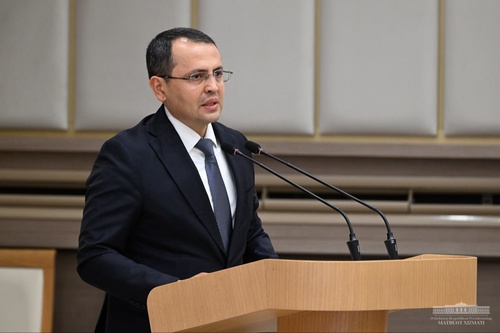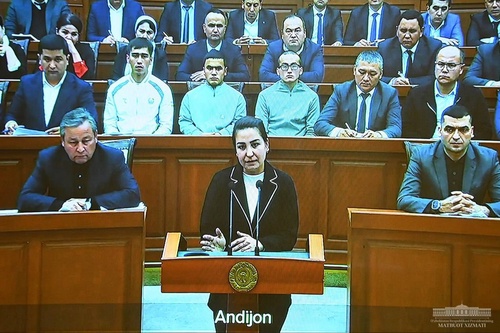New initiatives have been proposed to strengthen the social protection system.
Under the chairmanship of President Shavkat Mirziyoyev, a video conference meeting was held on December 13 to discuss the results of work in the field of social protection and priority tasks for 2025.
Uzbekistan is a social state. Based on this constitutional principle, the system of social support and assistance is becoming more accessible to the population. Centers for "Inson" have been opened in all regions, and 102 types of social services have been implemented in mahallas. Social workers, while visiting homes, provided assistance to an additional 95 thousand people in need who were not previously included in the registry. Disability was established for 51 thousand individuals, and 26 thousand received prosthetics. Four thousand lonely elderly individuals were identified, for whom home care was organized. Five thousand children with disabilities were enrolled in kindergartens and schools.
Thanks to this targeted work, the number of inquiries to public reception offices and khokimiyats regarding social services and assistance has decreased by 35 percent.
Three months ago, 14 thousand leaders at the regional and district levels were assigned to 75 thousand low-income families for individual work. As a result, 17 thousand people from these families were employed in permanent jobs, and the incomes of 14 thousand individuals increased through entrepreneurship and personal subsidiary farms. Thirty thousand children were provided with access to kindergartens, clubs, and vocational training, and 45 thousand people in need received medical assistance.
However, in some areas, the work has not been organized effectively enough. For instance, 184 leaders have not visited the homes of the low-income families assigned to them even once. The employment rate of people with disabilities across the country has reached an average of 20 percent, but in the Jalakuduk, Chimbay, Pastdargom, Chartak, and Denau districts, this figure is significantly lower. Out of 598 social facilities included in the investment program for the next year, none have been adapted for people with disabilities.
The meeting addressed the shortcomings and discussed further measures. The President presented new initiatives to strengthen the social protection system.
It was emphasized that to lift 1.2 million people out of poverty next year, it is necessary to address issues related to education, vocational training, healthcare, and improving living conditions.
There are successful examples. For instance, Early Development Centers have been opened in the Tashkent and Kasansay districts, where 4.2 thousand children from low-income families and children with disabilities received preschool education. Regional governors have been instructed to study this experience and implement it in every district.
Furthermore, next year, family kindergartens will begin operating in a thousand mahallas with high poverty levels. Starting from the new year, 15 percent of places in these kindergartens will be allocated to children from low-income families, and part of the payment will be subsidized by the state.
Additional opportunities will be created for the education of children from low-income families. One hundred eighteen thousand young people will undergo training in foreign languages, IT, and professional skills. Up to 80 percent of parents' expenses for these classes will be subsidized from the budget. In 2025, 3.5 thousand such children will be admitted to universities on a grant basis.
For 23 thousand individuals in low-income families who cannot move independently, care is provided by parents, spouses, or children. Starting in January 2025, home care will be organized for 19 thousand of them, and daytime supervision will be arranged for 4 thousand. This will allow 15 thousand individuals who previously cared for them to engage in work activities. The state will compensate 80 percent of the costs to the private sector providing care services. This initiative will first be implemented in Tashkent and will be rolled out to all regions by the end of the year.
Four hundred sixty thousand people from low-income families need medical assistance, and 6 thousand families require improved housing conditions. Next year, an additional 185 billion sums will be allocated to the medical insurance fund for covering surgical operations for those in need. Funds from "social notebooks" will be exclusively used to improve the housing conditions of low-income families and increase their incomes.
Currently, citizens must provide over 10 different documents to receive social services and assistance. Now, all of these will be replaced with a single social card. With this card, individuals will be able to use public transportation for free, receive compensation for electricity, gas, and education payments. Benefits and social assistance will also be transferred to this card. The system will be tested in Tashkent and the Yangiyul district until July 1, and then implemented nationwide.
The meeting also discussed issues related to supporting individuals with disabilities. The level of rehabilitation in 33 districts has proven to be extremely low. It has been instructed to organize rehabilitation services in every regional and district hospital. Funding for occupational therapy, physiotherapy, and therapeutic exercise services in 12 rehabilitation centers will be increased fivefold. Departments of rehabilitation will be opened in 7 medical universities, and instructors will undergo retraining based on the experience of Korea.
Some types of disabilities can be treated with exercises performed at home. For such patients, a program of exercises and a healthy eating menu will be developed. The effectiveness of rehabilitation will be assessed based on changes in the mobility and communication of patients, and based on this, doctors will receive salary bonuses.
Currently, the list of prosthetics and rehabilitation equipment has been expanded from 18 to 30 items, and their funding has increased by 1.5 times. Next year, it is planned to add another 7 types of equipment to meet the needs of 80 thousand individuals.
Thanks to the opportunities created this year, entrepreneurs have employed 40 thousand individuals with disabilities. Starting in January, the social tax rate for such enterprises will be set at 1 percent. Additionally, enterprises will receive subsidies of up to 50 million sums for services such as sign language interpreters, psychologists, and support for visually impaired employees. Private employment agencies that train and employ individuals with disabilities will be able to receive grants of up to 500 million sums.
During the meeting, other issues related to the implementation of planned measures were discussed, and suggestions from social sector specialists were heard.
 5
5 0
0